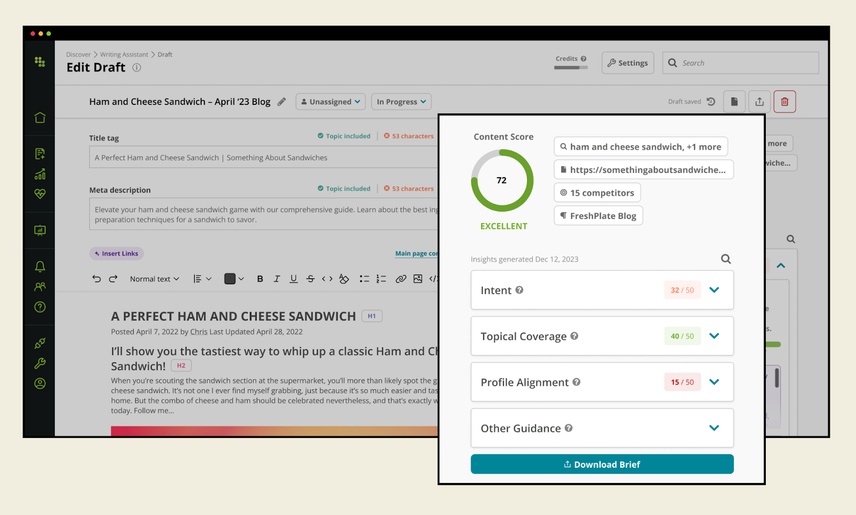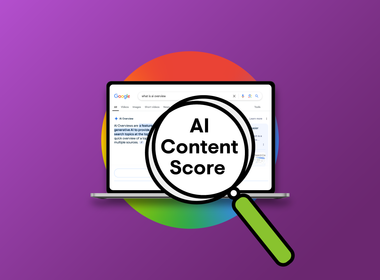Understanding AI Content Scores and Why They’re Important
With the rise of AI answer engines like ChatGPT and Perplexity , and the evolution of traditional search engines, brands are generating more and more content with the help of AI to try to establish their authority and expertise. But with more content being created by AI, how do you ensure the output is high-quality at scale?
The answer lies in leveraging AI content scoring. An AI content score provides a data-driven framework to evaluate, interpret, and optimize your content before publish, ensuring it resonates with your audience and performs across digital channels.
What is an AI content score, and why is it important?
An AI content score is a metric generated by some AI models to assess the overall quality, relevance, and optimization potential of a piece of content.
We're all being asked to do a lot more with a lot less, and that could be a recipe for disaster if you don't have proper guardrails on your content process, so you need a content score just to make sure things are good before you publish.
As a built-in feature of high-quality AI content generators, like Conductor Creator, an AI content score provides a consistent, data-driven evaluation based on a range of factors.
The reason you want to have a content score is to make sure that before you publish, you've ensured that you're going to meet the needs of your audience. Because it's an expensive process to publish content with all the time and resources involved, you want to make sure that you're doing everything you can before you hit publish.
The primary purpose of an AI content score is to:
- Provide an objective, measurable benchmark for content quality
- Pinpoint specific areas for improvement, from clarity to keyword and topic relevance
- Act as a guardrail for AI content generation
- Help maintain brand voice, style, and factual integrity across all content
- Optimize content to rank higher in traditional search and be favored by AI answer engines
- Streamline the content creation and optimization process, allowing teams to scale content production without sacrificing quality
Content scores are only going to get more important as content processes continue to get more automated. With AI generating more content, teams are going to need AI content guardrails to ensure that content is on-brand and high-quality, or else your authority and visibility will be at risk long-term. A content score is an important check to make sure that your content meets your internal benchmarks and scoring metrics.
How are AI content scores calculated?
Determining an AI content score involves advanced natural language processing (NLP) and machine learning algorithms. AI models are trained on massive datasets of high-quality content, enabling them to understand patterns, context, and semantic relationships within text.
Content score [in Conductor] gives you a framework to understand the quality of your content, and when we think about quality, it’s not just in terms of using the right keywords, or old-school SEO quality, but are you aligning your content with the needs of your audience? Are you connecting with the people who are searching for this topic? Are you providing information that's helpful for them?
It’s important to note that not all AI content scoring systems work the same way, and not all are trained on the same quality of data. AI Content Score in Conductor Creator leverages the freshest real-time search data to ensure your score is accurate and actionable. Here’s what that workflow looks like:
- Content crawling: The AI tool ingests your written content, breaking it down into manageable units for analysis.
- Feature extraction: The algorithm extracts various features from the text. This includes everything from keyword density and semantic relevance to sentence structure, grammar, and sentiment.
- Comparative analysis: The AI compares your content’s features against established benchmarks for high-performing content, often drawing from successful examples within your industry or topic.
- Scoring model application: A predefined scoring model, often a complex algorithm, weighs different features based on their impact on content quality and performance. For instance, how deeply you explore a topic will likely carry more weight than a minor grammatical error.
- Score generation: The model then calculates an overall score, often presented as a numerical value or a percentage, along with detailed feedback on specific areas.
The old way of doing content score would basically look at traditional SEO factors, like title tag and meta description, and target keyword coverage. So it was very surgically precise around specific words and factors that aren’t particularly human-focused; they’re much more algorithm-focused. You're trying to make sure that mathematically, your word usage is correct, basically.
But that just really breaks down when you're thinking about why we're creating content. It's not to put the right words on a page for its own sake, or to put the right words on the page to trick Google into thinking that we're better than everybody else. It's to solve problems for our audience and connect with the people who are likely to be searching for our products.
How accurate is AI content scoring?
The accuracy of AI content scoring depends entirely on the AI model you’re leveraging and the quality of the data it was trained on.
While AI writing assistants can achieve high levels of accuracy in identifying grammatical errors, structural issues, and keywordKeyword
A keyword is what users write into a search engine when they want to find something specific.
Learn more relevance, they may struggle with more nuanced writing aspects like sarcasm, subtle humor, or highly subjective interpretations of creativity.
AI is a powerful diagnostic tool, but it is not perfect. It provides a data-driven perspective that complements human insight, and reinforces the importance of a human-in-the-loop approach to AI.
The new approach to content scoring is built for the AI content landscape, where there’s a lot more specific search intent. Our new AI Content Score in Conductor is based on addressing things like intent alignment, topical coverage, and things that a human can read and understand the value of.
We've gotten to a point where we can pretty reliably use LLMs to translate that qualitative aspect by asking questions like: Is the intent alignment good? Am I connecting with the audience well? And turn those qualitative factors into a score.
How to interpret your AI content score
Your content score isn’t just a number; it is a tool that highlights specific areas where you can improve your content.
Here are the main scoring factors AI typically evaluates:
- Writing style consistency: AI can identify deviations in voice and tone, helping you ensure every piece of content sounds like your brand.
- Creativity and originality: AI can evaluate the uniqueness of your content. Does it offer fresh perspectives? Is it just rephrasing existing information, or does it provide unique insights? High scores here indicate content that stands out and avoids generic language.
- Grammar and integrity: AI checks for grammatical errors, spelling mistakes, punctuation issues, and the overall language of your content to ensure quality and consistency.
- Structure and readability: AI analyzes how your content is organized. Are headings used effectively? Are paragraphs concise? Is there a logical flow that guides the reader? Well-structured content is easier to consume, leading to better engagement metrics like time on page and lower bounce rates.
- Clarity and coherence: Does your content make sense? Is the message clear and unambiguous? AI evaluates how your ideas progress, ensuring that each sentence and paragraph ties back to the overall topic. Content that is clear and coherent is more helpful and impactful for your audience.
- Topical authority and relevance: This is particularly important for SEO and AEO / GEO. AI assesses how thoroughly your content covers a topic, including semantically related terms and subtopics. A high score here indicates that your content is a comprehensive resource, positioning you as an authority in your field.
What is a “good” AI content score?
It’s important to set expectations that a content score is only reliable if the AI model is basing that score on the freshest and most comprehensive possible dataset.
There is no universal "good" AI content score. Your ideal score can vary based on your industry, content type, and specific performance goals, but generally, a higher score indicates better alignment with optimization best practices and a better chance to perform well in search and answer engines.
The most valuable aspect of an AI score isn’t the number itself, but the actionable feedback and optimization opportunities it provides.
The qualitative factors that drive content scoring for AI can be really hard to put a number on. So, I would emphasize consistency more than accuracy. There's not a precedent for a 1 to 10 scale for audience alignment, for example. So our task is to find a way to consistently be really actionable and directional.
Even if you have the most surgically precise content score, we could score it at an 87.26, for example. What does that help you do? Our underlying philosophy is that a score needs to motivate you towards action.
How can I get my AI content score?
Integrating AI content scoring into your workflow can transform how you approach content creation and optimization. It provides a systematic, data-driven method to enhance quality and efficiency. From draft reviews to content audits and optimizations, content scores help you review, create, and publish content with ease and confidence.
For example, Conductor’s Content Score feature provides real-time insights and recommendations as you write, ensuring your content is optimized to succeed before you hit publish. It dives into your content, factoring in how thoroughly you cover a topic, your unique expertise, whether the content satisfies your audience’s intent, and provides detailed instructions on how to improve the content.
Curious to see a deep dive of content score capabilities across AI Writing Assistants? Check out our in-depth guide.
With Conductor Creator, you gain access to:

- AI Content Score: Get real-time, data-driven insights into your content's quality and optimization potential.
- AI Writing Assistant: Accelerate productivity with AI-generated content suggestions and intelligent recommendations built to optimize your content production efforts.
- Content optimization: Ensure your content is optimized to succeed in both traditional search and AI answer engines before you hit publish.
Want to learn more about Conductor’s AI Content Score? Check out our latest blog on the feature release.
How to improve your AI content score
Achieving a high AI content score is not just about pleasing an algorithm; it is about creating genuinely helpful, high-quality content that serves your audience and drives business outcomes. Here are some actionable tips to enhance your content and achieve better, more reliable AI scores.
- Improve clarity and conciseness: Simplify complex sentences and explain jargon. AI models reward clear, direct communication. Break down lengthy paragraphs into shorter, punchier ones. Remember, shorter paragraphs improve readability and help key information stand out.
- Leverage diverse language: Avoid repetitive phrasing. Vary your vocabulary and sentence structures to make your content more engaging. AI recognizes and rewards rich, natural language that avoids keyword stuffing.
- Strengthen structure and flow: Use clear, descriptive headings (H2s, H3s) to break up your content and guide the reader. Incorporate bulleted or numbered lists to present information in an easily digestible way.
- Expand topical coverage: Go beyond surface-level information. AI scores often reflect how comprehensive your content is. Address related subtopics, answer common questions, and provide thorough explanations to establish your content as an authoritative resource.
- Optimize for user intent: Ensure your content directly answers the questions your audience is asking. AI models are increasingly sophisticated at understanding user intent. Content that precisely matches intent will score higher and perform better in search.
- Leverage AI-powered writing assistance: Solutions like Conductor’s Writing Assistant provide real-time suggestions for improving your content as you write. From rephrasing sentences to suggesting relevant keywords, these tools accelerate the optimization process.
AI content scores in review
AI has changed content as we know it. In order to ensure your content is set up for success, you need to fight AI with AI and leverage an AI content score. By understanding and strategically applying AI content scoring, you empower your teams to produce high-quality, high-performing content at scale. This approach ensures your content is not only seen but also resonates with your audience, driving meaningful engagement and measurable results.
FAQs
- What are content guardrails?
- How do you increase brand mentions and citations in AI?
- What is a knowledge cutoff?
- What are AI hallucinations?

![Sam Billetdeaux, Principal Product Manager, [object Object]](https://cdn.sanity.io/images/tkl0o0xu/production/7bff75b914a4c0ad0996a3fbb86c6850c3e1629f-379x379.jpg?fit=min&w=100&h=100&dpr=1&q=95)






